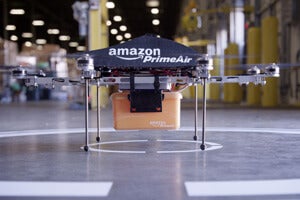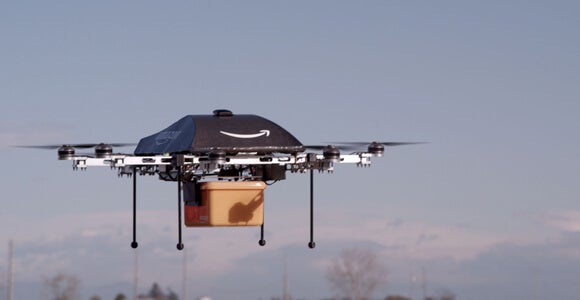In a recent 60 Minutes interview, Amazon CEO Jeff Bezos boasted that his company would soon offer 30-minute delivery by drone in a feature called Prime Air.
“It looks like science fiction, but it’s real,” Amazon’s bare-bones Prime Air webpage boasts. “From a technology point of view, we’ll be ready to enter commercial operations as soon as the necessary regulations are in place.”
One could argue that Bezos is making the case for critics that the tech industry is experiencing another bout of irrational exuberance. Justifiably or not, Bezos is very, very bullish on commercial drones. Just think, they are to trucks and planes what the Internet is to paper.
The Prime Air gambit is not, however, pure hype: The webpage features a video of a recent drone test flight in which a tiny robotic helicopter carries an adorable little package out of an Amazon fulfillment center.
Bezos admitted that 30-minute delivery won’t soon be available for kayaks. And with just a dozen Amazon fulfillment centers in the United States, even those adorably small purchases would take more than a half an hour to reach most consumers. But drones can move two kilograms 10 kilometers for $0.24, according to one estimate.
The not-so-subtle subtext of the Prime Air announcement seems to be to exert pressure on the U.S. Federal Aviation Administration to hurry up and okay commercial use of unmanned aircraft, or drones. 45 words of a 174-word FAQ on Bezo’s bold claim address expected FAA regulations.
Drone flights like the one shown in the Amazon video currently require a waiver from the FAA since they are not generally allowed. But, with the price of the machines falling precipitously and their size dwindling to toy-size, the FAA began in 2012 to consider how the commercial and private use of drones ought to be permitted in U.S. airspace.
The FAA was instructed by Congress to “develop a comprehensive plan to safely accelerate the integration of civil unmanned aircraft systems into the national airspace system.” In other words, non-governmental use of drones will be legal.
 The administration proposed to open six test sites to evaluate how drones and conventional aircraft can safely share airspace and to stay abreast of potential privacy concerns for citizens on the ground. The pilot program was delayed due to public outcry about privacy. But the FAA now says it will choose the sites, which are tasked with writing their own privacy policies, by the end of 2013.
The administration proposed to open six test sites to evaluate how drones and conventional aircraft can safely share airspace and to stay abreast of potential privacy concerns for citizens on the ground. The pilot program was delayed due to public outcry about privacy. But the FAA now says it will choose the sites, which are tasked with writing their own privacy policies, by the end of 2013.
The regulations are expected by 2015. Besides really sexy delivery methods and law enforcement, potential uses for drones include disaster response, news gathering, cargo transport, scientific research, agriculture, mapping and — you guessed it — advertising.
The FAA has cited a report from the drone industry group, Association of Unmanned Vehicle Systems International, predicting that there is “tremendous potential for economic growth in this field.”
It seems Bezos agrees.
Images and video courtesy Amazon



